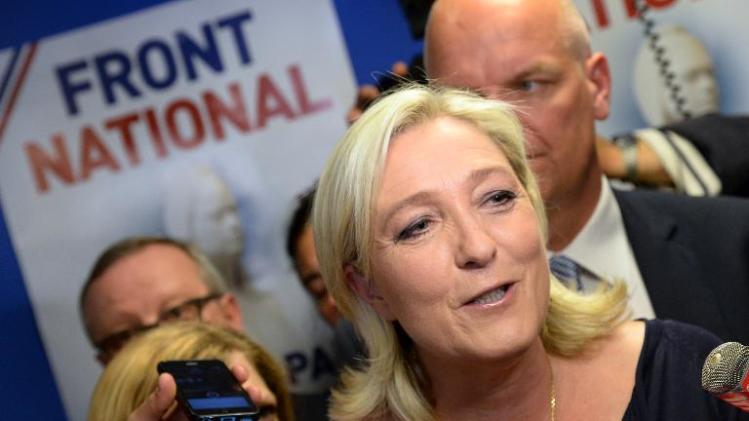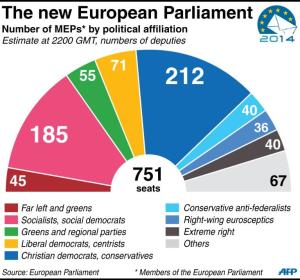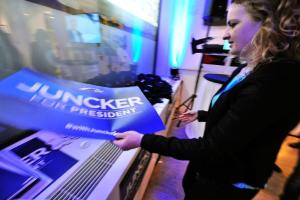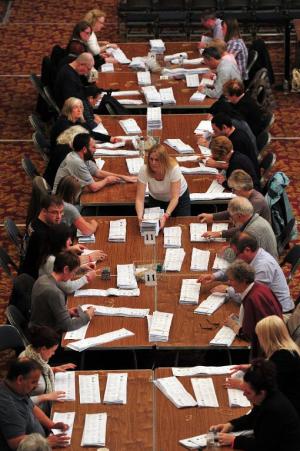5/26/2014
France's far-right leads EU eurosceptic 'earthquake'
Brussels (AFP) - France's far-right National Front stormed European Parliament polls as eurosceptic parties dished up a harsh reality check that sent shockwaves across the EU and beyond.
The Parliament's own projections showed the extent of the anti-EU breakthrough, with eurosceptic parties set to win around 140 seats in the 751-seat assembly.
The most emphatic results came in France where the National Front (FN) won around 26 percent of the vote, according to official figures, and in Britain where early results suggested a solid victory for the United Kingdom Independence Party.
The anti-EU Danish People's Party was also victorious, while far right groups had strong showings in Hungary and Greece, among others.
Projections for the European Parliament as a whole showed the centre-right European People's Party holding on to its top spot with 212 seats, though it looks to have lost 62 in the process.
The Socialists are second with 185, down from 196. The ALDE Liberals group would be third with 71 seats, ahead of the Greens at 55 and the left GUE/NGL with 45.
If confirmed, the FN victory in France would be the highest ever national vote garnered by the anti-immigration, anti-EU party led by Marine Le Pen who has promised to shake up the country and the EU.
It easily beat the centre-right UMP on 20.6 percent, and humbled President Francois Hollande's Socialists, which came a distant third with just under 14 percent.
The French people "no longer want to be ruled from outside, to have to submit to laws they did not vote for or to obey (EU officials) who are not subject to the legitimacy of universal suffrage," she said.
"Lessons have to be learned," a Hollande aide conceded. "We have to find a way of convincing the French people that we can change Europe without leaving Europe."
There was better news for the pro-EU camp in Germany where Chancellor Angela Merkel's conservative party won around 36 percent of the vote, while its coalition partner, the centre-left Social Democrats, scored some 27 percent.
But even in the EU's most powerful member state, the nay-sayers were not totally denied, with the anti-euro Alternative for Germany taking 6.8 percent of the vote, putting it above the threshold for seats just a year after the party was formed.
- 'Political earthquake' -
Eyes were also on the turnout, which has fallen every year since the first election in 1979, reaching a record low of 43 percent in 2009.
Even a miniscule improvement to 43.09 percent was therefore treated as a historic turning point by europhiles.
However, many of those voters came out to support anti-euro and anti-immigration parties who had tapped into growing voter frustration with the EU, saying Brussels has too much power and does not listen.
In Britain, the eurosceptic UKIP led by Nigel Farage -- a party without a single seat in the national parliament -- had 22 seats after nine of the 12 regions declared.
They were comfortably ahead of the 16 seats for the Conservatives of Prime Minister David Cameron and 14 seats for the main opposition Labour Party.
Farage said UKIP was on course to cause a political "earthquake."
"Up until now, European integration... always seemed to be inevitable and I think that inevitability will end with this result tonight."
Victory for UKIP would be the first time in over a century that a British election has not been won by either of the mainstream Conservative or Labour parties.
Left-wing parties performed strongly in Italy, Spain and Greece.
Italian Prime Minister Matteo Renzi's centre-left Democratic Party (PD) pulled out a stunning win with 41.5 percent of the vote, well ahead of the anti-establishment Five Star Movement (M5S) on 22.4 percent, according to early projections.
In Spain, the two mainstream parties, the ruling conservative Popular Party and the Socialist Party, lost ground to mostly smaller groups on the left.
The inroads made by the anti-EU and radical parties have stoked concern they could hold Parliament hostage, working against the EU from within, but analysts say such fears may be overdone.
The EPP and Socialists would hold about 400 seats in the new assembly of 751 and traditionally the two groups have worked together and should be able to continue to do so, they said.
For his part, European Commission head Jose Manuel Barroso called on the pro-EU groups, who "have overall won once again" to come together.
"Standing together as Europeans is indispensable for Europe to shape a global order where we can defend our values and interests," Barroso said.
- Democratic deficit -
Faced by mounting hostility to the Brussels bureaucracy, which is seen as aloof, EU political leaders have worked hard to correct a so-called "democratic deficit".
For the first time, the five main groups in parliament named candidates to be the next head of the powerful European Commission and sent them out on the campaign trail.
They also organised televised debates between the candidates, exposing them to the harsh light of public questioning.
Summing up the hopes of reconnecting with the bloc's 500 million people, a giant banner hung at EU headquarters in Brussels read: "This time it's different -- Your vote counts."
Analysts have their doubts, however.
"The European Parliament's bid to politicise and personalise the vote has not worked," said Jean-Dominique Giuliani of the Robert Schuman Foundation.
It is not even clear if Parliament's choice for head of the Commission will actually be selected.
Herman Van Rompuy, who chairs the European Council grouping of heads of state, has made it clear it was not ready to hand over that power so easily.
That opens the door to a potential institutional clash that could further discredit the EU just after voters have given it a damning appraisal.




No comments:
Post a Comment